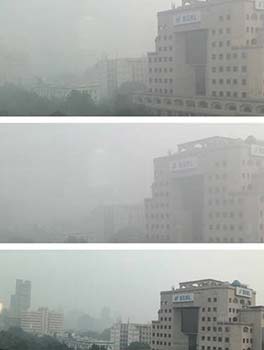New Paper Identifies Air Pollution Research Priorities for India
[ad_1]
By Tara Failey
Nadadur served as a principal organizer of the Indo-U.S. workshop following his time as a U.S. Embassy Science Fellow in India.
(Photo courtesy of NIEHS)
Representing the culmination of two years of bilateral dialogue, a new paper provides a roadmap to address air pollution research needs and gaps in India. Recently published in Environment International, the paper outlines the state of air pollution health research in India, approaches to address air pollution-related health effects, and opportunities to promote collaborative research initiatives between the U.S. and India.
The position paper grew out of a joint Indo-U.S. workshop held in New Delhi on Nov. 8 – 10, 2016, focused on bilateral research opportunities to address air quality and health issues in India. The workshop brought together NIEHS and partners both from the U.S. and India to build a community of practice on air pollution and health.
‘Our goal was to initiate dialogue on how to start the process of addressing the air quality and health issue,” said Srikanth (Sri) Nadadur, Ph.D., NIEHS program director, who is the senior author of the paper and oversees a research portfolio on air pollution and human health. “This manuscript is an outcome of the workshop, as well as a series of virtual meetings and visits of U.S. scientists to Indian laboratories.”
NIH Director’s Award Recognizes NIEHS Global Health Efforts
Nadadur, and colleagues from NIEHS and Fogarty International Center who jointly administer the Global Environmental and Occupational Health (GEOHealth) Program, were recently recognized with an NIH Director’s Award for “conceptualizing and implementing the Global Environmental and Occupational Health (GEOHealth) program, an ambitious approach to integrating scientific research, training, and outreach through regional hubs.”
Identifying Goals
India has some of the highest air pollution levels in the world. According to the World Health Organization (WHO), India has 13 of the world’s 20 most polluted cities in terms of particulate matter smaller than 2.5 micrometers (PM2.5). Its capital, New Delhi, is the city with the worst ambient air pollution in India. Air pollution has been blamed for a sharp rise in respiratory diseases, cardiovascular disease, and irreparable lung damage. Even as air quality worsens, the country has lacked the public health capacity to adequately address these problems.
To help build the evidence base for public health action, the authors identified a range of short- and long-term goals for potential collaborative research. Short-term priorities focus on research analyses that use available data sets on air pollution and health to answer urgent public health concerns. This could help answer questions on whether past, severe air pollution events, like a recent smog episode in New Delhi, led to increased hospital visits and asthma attacks. Long-term goals focus on a range of capacity-building strategies, which include:
- Building a nationwide air pollution monitoring system.
- Strengthening scientific expertise in exposure assessment.
- Developing data infrastructure to aggregate health effects data.
- Creating national and regional databases of exposure and biological data.
Building Capacity through Collaboration
To achieve these goals, the paper’s authors emphasize the importance of sharing expertise, technology, and experience from the U.S. and elsewhere to benefit researchers in India. “There is no need for India to reinvent the wheel,” said Nadadur. “The U.S. is a global leader in addressing the air pollution and health research issue. By working together, this knowledge can be translated and applied in India.”

In November 2017, New Delhi suffered from some of the worst air pollution on record. A time series of photos from Central Delhi shows the severity over three days.
(Photo courtesy of Betsy Galluzzo)
NIEHS research expertise is being shared with Indian researchers, especially in the areas of pollution exposure assessment and epidemiological studies. Additionally, the authors state that specific technologies, commonly used in the U.S., could be implemented on a broad scale to improve the accuracy of air pollution data in India. Examples include personal, wearable air pollution sensors and real-time air quality monitors.
“Being in Delhi during a period of high levels of air pollution brought home the severity of these issues in India for me,” said Gwen Collman, Ph.D., director of the NIEHS Division of Extramural Research and Training, who attended the workshop and co-authored the paper. “We hope that our efforts advance research capacity and collaborations that bring new insights to help policymakers make strides to improve air quality and improve respiratory and cardiovascular health in India.”
Looking Ahead
Moving forward, this community of researchers is already thinking about the next steps. “If things go well, we’d like to start some joint funding efforts,” said Nadadur. “Through this approach, Indian agencies would fund Indian investigators, while NIEHS would fund U.S. investigators to work in partnership to advance common air pollution health research goals.”
“Through the Indo-U.S. workshop, we were able to bring together researchers to open the breadth of research that can be accomplished, and increase opportunities to be part of critical research,” said Nadadur. “It’s our hope that our recommendations will facilitate ongoing joint activities among air pollution experts from India and the U.S.”
The Indo-U.S. Workshop to Explore Bilateral Research Opportunities to Address Air Quality and Health Issues in New Delhi, India, involved three days of meetings, talks, and workshops. The workshop, jointly sponsored by NIEHS and the Indo-U.S. Science and Technology Forum (IUSSTF), helped establish a network of collaborations among academic and government scientists to improve scientific expertise in India.
As a follow-up to the workshop, a series of virtual meetings initiated by NIEHS led to the formation of Communities of Researchers (CoRs) organized around three themes: health research, exposure assessment, and training.
Citation: Gordon T, Balakrishnan K, Dey S, Rajagopalan S, Thornburg J, Thurston G, Agrawal A, Collman G, Guleria R, Limaye S, Salvi S, Kilaru V, Nadadur S. 2018. Air pollution health research priorities for India: perspectives of the Indo-U.S. Communities of Researchers. Environ Int 119:100-108. [Abstract]
[ad_2]


